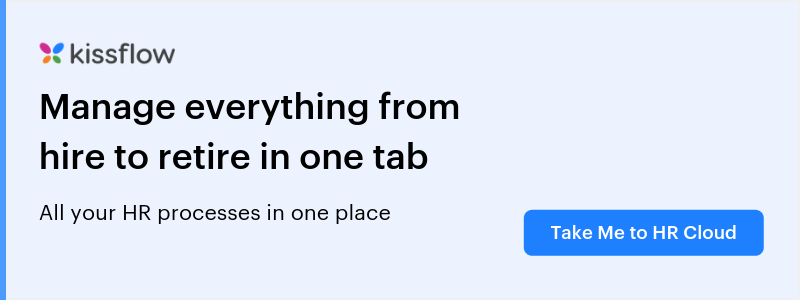6 Hiring Best Practices that are Essential to Improve the Recruitment Process
The HR hiring process has undergone many transformations through the years. From the rise of social recruitment to personalized job searches, companies are looking for the best HR management tools and working hard to discover the right candidates and the right positions together.
Your hiring process can become even more efficient if you adopt the finest new hiring practices and the best HR management softwares in the field.
Without further ado, here are the top 6 hiring practices to make your HR recruitment process better than ever before.
1. Go Social
If you’re not doing social recruiting yet, you’re missing out on a huge opportunity to attract talented professionals to your organization.
A Jobvite survey shows that 92 percent of recruiters rely on social HR tools to find suitable candidates for open positions. Another noticeable hiring practice is that the majority of organizations are spending more on social hiring to find the right people.
As one of the pioneering social HR tools, LinkedIn provides incredible chances to build an influential professional network and communicate directly with top talent in the field. It’s also a good idea for company employees to source talent from social networks. Referrals are one of the most reliable sources for finding the right people and referrals coming via social channels are no exception.
2. Automate, Automate, Automate
The HR recruitment process is complicated. It requires strategic HR planning, the meticulous maintenance of records, and using the right metrics to base hiring decisions on. In today’s technology-driven world, you can easily be overwhelmed with your present HR recruitment tool if it doesn’t offer recruitment automation.
The manual screening of resumes is a very uphill, time-consuming task. On average, a recruiter spends approximately 23 hours to sift through resumes for a single hire. There is technology to address this problem which gives HR professionals a chance to focus solely on the most qualified candidates. But hopping from one software to another is just reinventing the wheel if you aren’t being smart about using technology. That’s where HR automation comes in.
Automating your HR recruitment process allows you to customize steps to meet the specific needs of your organization. An automated HR management tool lets you set a tailored approach and bridges the gap between all your software applications to solve the most common hiring challenges.
3. Optimize for Mobile
Prospects nowadays rely heavily on mobile platforms to look up information about available jobs. Statistics from a recent survey suggests that 45 percent of candidates apply for jobs via mobile website. HR professionals should, thus, think of ways to target this increasing demography and place job ads in places where they will get more visibility. They can use their company’s social presence as a potential HR tool to attract desired candidates.
Just like a falling tree in a jungle without anyone doesn’t make any sound, your job broadcasts – no matter how well-executed and with what sort of an HR tool – will die a silent death if they are not optimized for mobile. Mobile is a very fertile ground to court great candidates especially for positions that require millennials. After all, they are digital natives, technophiles, and notorious for being zombies.
4. Embrace Applicant Tracking Platforms
A good applicant tracking system is another powerful option to consider in order to enhance your HR recruitment process.
Unlike traditional HR management tools, an applicant tracking system processes applications in real-time and offers industry-specific features for faster results, responding and sorting through tons of data in shorter span of time. It’s also possible for you to post job ads across multiple platforms from one place, so that you can get the most exposure right from the start.
5. Streamline the Interview Process
No matter how smart, a recruitment tool can only do so much. Technology can always supplement processes, but you have greatness in your hands if your processes are already efficient and ready to take on more challenges. Interviewing candidates is an extremely time-consuming process if you don’t have the right ingredients to the mix.
Consider this, the best industry professionals you are looking for are usually the busiest people around. It’s likely that these professionals are: either already an employee for another company, freelancing or doing consulting job, or busy thinking about the next innovation in their field. It’s not always easy to be readily available to attend a job interview. However, technology can help HR solve this problem.
It’s common to hear people giving job interviews on Skype these days. There are other platforms that are augmenting the virtual experience of a job interview process to fill the geographical time zone void and other real-world constraints. Going by the speed of advancement in virtual reality technologies, who knows – 3D holographic technology may be the next HR automation tool for candidates to appear for job interview.
6. Move to Data-Driven Decision Making
Recruiters, along with leaders in other corporate verticals, are moving from pattern-based decisions of the past to data-driven recruiting as a practical HR tool.
Big data, predictive models, and the selection of relevant metrics have become the norm in many corporate fields. Sales professionals probably can’t imagine doing their jobs without relying on such intelligence. HR departments couldn’t stay out of touch for too long, and they are catching up with the best hiring practice to exploit the advantage of such a powerful information resource.
Through the collection of relevant data, companies can now know which channels lead to the best hires, what the characteristics of ideal candidates are, and whether the company is capable of ensuring the retention of such professionals. Naturally, the approach will result in better selection and reduced employee turnover in the long-run.
In essence, data could be used to predict behaviors and come up with patterns for the future. As technology advances even further, employers will gain access to even more thorough reports that will enable intuitive recruitment decisions.
Take Your Hiring Practices Seriously – Automate Recruitment
It’s no news that businesses that can’t keep up with today’s fast-changing business environment become redundant and eventually fade to obscurity. Hiring talented recruits is as much an important aspect of running a business as it is to sell your company’s products or services.
Automating your recruitment and selection process is one of the most important recruitment trends you can’t miss out on, and you can test out how HR Process automation fares for your HR department without incurring any financial loss. You can start it over with a free trial of Kissflow HR Cloud. It allows businesses to harness the power of technology to better understand the needs of candidates and keep them engaged.
Customize the recruitment module to your preference, and see the difference it can bring to your HR’s recruitment efficiency.
Related Articles:
- How to Choosing the Best HR Software
- HR Management Software for Your Small Business
- Best Recruitment Tools
- Best HR Tools
- Employee Onboarding Software
- Applicant Tracking Tool


